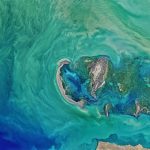 May 21, 2019 10:34 am
Published by Climate Extremes
May 21, 2019 10:34 am
Published by Climate Extremes
The study proposes a conceptual model of lagoon island formation, which incorporates aeolian sedimentation and episodes of wave and tide over-wash. Although not part of the core CLEX program, this study represents an interesting multi-disciplinary application of our work on tropical storms to geomorphology.
 May 13, 2019 2:57 pm
Published by Climate Extremes
May 13, 2019 2:57 pm
Published by Climate Extremes
New research confirms the long-term cooling over Antarctica during the last millennium and the delayed onset of anthropogenic warming are found in simulations that assimilate palaeoclimate data. This is not evident in simulations without data assimilation.
 May 13, 2019 2:19 pm
Published by Climate Extremes
May 13, 2019 2:19 pm
Published by Climate Extremes
This study employs a new statistical approach to reconstructing ENSO which enables researchers to identify times in the past when palaeo-ENSO reconstructions are most robust. They found that ENSO reconstructions are most reliable from 1580-1700, and from 1825 to present.
 May 8, 2019 1:23 pm
Published by Climate Extremes
May 8, 2019 1:23 pm
Published by Climate Extremes
CLEX researchers present a new method to examine seasonal variations in the global wave climate that accounts for the full directional wave spectra and includes wave systems with different frequencies and directions separately.
 April 29, 2019 2:19 pm
Published by Climate Extremes
April 29, 2019 2:19 pm
Published by Climate Extremes
CLEX researchers found that applying a statistical correction to projected sea surface temperatures has a major impact on changes to rainfall with global warming, leading to a 25% reduction in future precipitation projected for the south-western Pacific.
 March 25, 2019 1:58 pm
Published by Climate Extremes
March 25, 2019 1:58 pm
Published by Climate Extremes
CLEX researchers and colleagues discovered which species are most important in transferring climate change impacts through the ecosystem using a model that simulated the southeast Australian ecosystem through to 2050.
 March 22, 2019 3:52 pm
Published by Climate Extremes
March 22, 2019 3:52 pm
Published by Climate Extremes
A new framework for cyclone jet interaction improve our understanding of how the turbulent atmosphere is organised in coherent motions via the jet stream
 March 8, 2019 2:21 pm
Published by Climate Extremes
March 8, 2019 2:21 pm
Published by Climate Extremes
CLEX researchers evaluate the performance of CORDEX simulations over Australia against gridded observations of temperature and precipitation.
 March 8, 2019 9:27 am
Published by Climate Extremes
March 8, 2019 9:27 am
Published by Climate Extremes
How wet the soil is before a storm can determine the amount of rain that falls. This research also produced some interesting findings for rainfall in Australia.
 March 6, 2019 4:23 pm
Published by Climate Extremes
March 6, 2019 4:23 pm
Published by Climate Extremes
New research suggests that the concept of maximum evaporation reported here is a natural attribute of an extensive wet evaporating surface. This provides a fundamental new insight as to how radiation, evaporation and temperature are interlinked.










